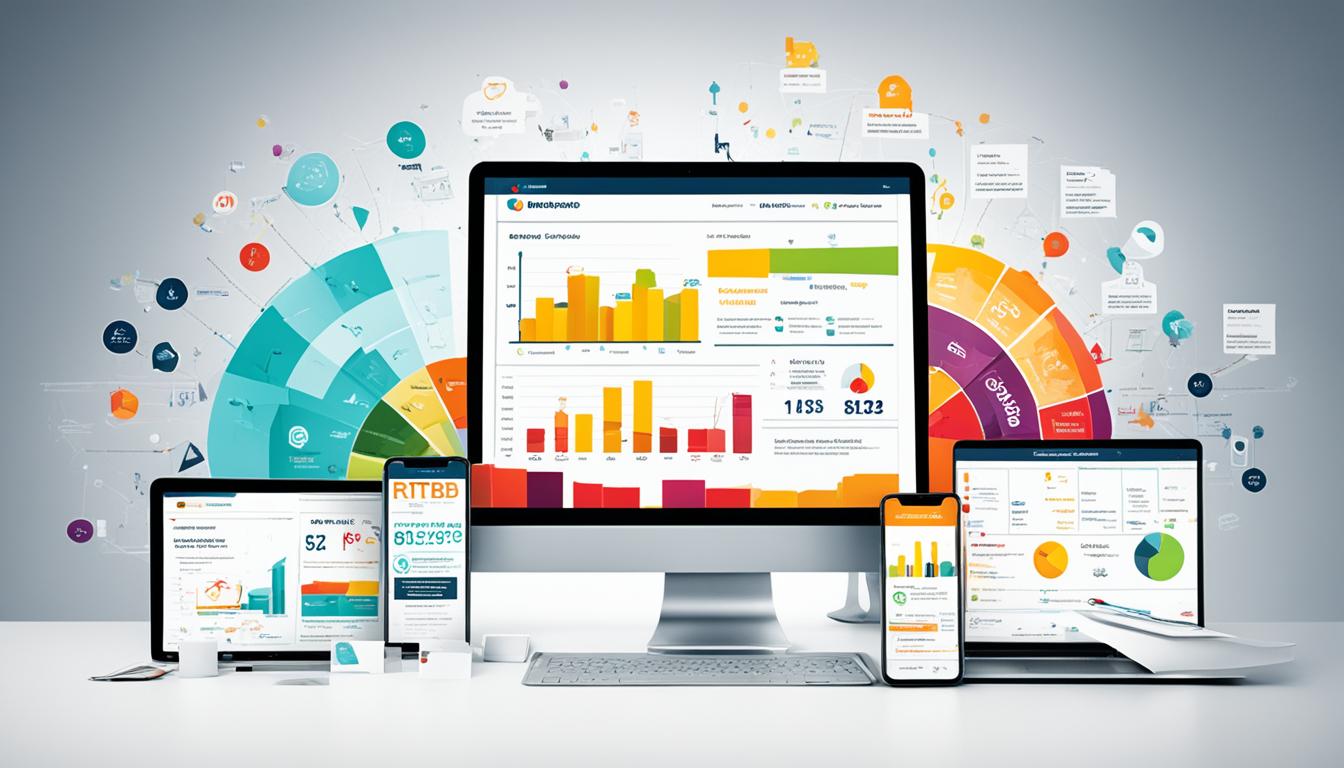BayWa, a leading international agricultural trading and services company, has developed a comprehensive marketing strategy to drive consolidation, profitability, and growth for the year 2024. With a focus on optimizing its business units and identifying areas for divestment and expansion, BayWa aims to strengthen its position in the market and ensure long-term success.
Key Takeaways:
- BayWa’s Marketing Strategy 2024 aims to consolidate and increase profitability.
- The company plans to optimize its business units and identify areas for growth.
- The Renewable Energies Segment is expected to continue its growth in international markets.
- BayWa has digitized its contract management to improve efficiency and flexibility.
- Growth opportunities and diversification are key priorities for BayWa’s future success.
Areas for Growth and Optimization
As part of its BayWa Marketing Strategy, the company is committed to optimizing its business divisions and administrative units, identifying areas for growth and profitability. BayWa aims to strengthen its market position by focusing on key industries that offer significant growth potential and drive profitability.
Focus on International Grain and Specialty Products Trade
One of the major areas for growth identified by BayWa is the international grain and specialty products trade. With its extensive experience and expertise in the agricultural sector, the company aims to capitalize on the increasing demand for quality grain and specialty products across global markets. By expanding its reach and improving its supply chain management, BayWa aims to drive revenue growth and enhance profitability in this sector.
Investing in Renewable Energies
Another key area that BayWa is prioritizing for growth is renewable energies. As the world shifts towards more sustainable and environmentally friendly energy sources, BayWa recognizes the immense potential in this sector. The company plans to expand its renewable energy portfolio by investing in solar, wind, and biomass projects. By leveraging its expertise in project development, financing, and operations, BayWa aims to drive revenue growth and contribute to a cleaner and greener future.
Optimizing Agriculture and Building Materials Business Units
In addition to focusing on growth areas, BayWa is also committed to optimizing and improving its existing business units. The agriculture division, with its extensive network of farmers and its commitment to sustainable farming practices, is a key area that BayWa aims to further develop. By leveraging advanced technologies and innovative solutions, the company plans to enhance productivity and efficiency in the agricultural sector while ensuring long-term sustainability.
The building materials business unit is another area that BayWa seeks to optimize. The company aims to streamline operations, improve supply chain management, and enhance customer experience in this sector. By leveraging its strong industry partnerships and adopting efficient procurement strategies, BayWa aims to drive growth and improve profitability in the building materials segment.
In summary, BayWa’s strategy for growth and optimization focuses on key industries such as the international grain and specialty products trade and renewable energies. The company also aims to optimize its agriculture and building materials business units to drive growth and enhance profitability. By strategically investing in these areas and leveraging its expertise, BayWa is well-positioned to capitalize on market opportunities and achieve its long-term business objectives.
Segment Performance
BayWa operates in multiple business segments, each with its own performance and outlook.
Renewable Energies Segment
The Renewable Energies Segment experienced weaker demand in the solar module trade, which impacted its revenues. However, the company remains optimistic about its growth potential in international markets as it continues to expand its renewable energy portfolio.
Energy Segment
The Energy Segment faced a decline in revenues due to weaker trading momentum. However, BayWa sees opportunities in the emerging market of electromobility and is actively exploring this sector to drive future growth.
Cefetra Group Segment
The Cefetra Group Segment exceeded its previous record result, demonstrating strong performance in the international grain and specialty products trade. This segment has proven to be a high-growth area for BayWa.
Agri Trade & Service Segment
The Agri Trade & Service Segment encountered challenges due to market conditions. Despite the difficulties, BayWa remains committed to optimizing and improving this segment to enhance its profitability.
Agricultural Equipment Segment
The Agricultural Equipment Segment witnessed an increase in revenues and expects this upward trend to continue. As BayWa continues to invest in modern and advanced agricultural machinery, it is well-positioned to capture growth opportunities in this segment.
Global Produce Segment
The Global Produce Segment faced difficulties due to natural disasters, impacting its sales performance. However, BayWa remains resilient and committed to overcoming these challenges to restore growth in this segment.
Building Materials Segment
The Building Materials Segment experienced a decline in sales, primarily influenced by market conditions and economic factors. BayWa is actively exploring strategies to revitalize this segment and improve its performance.
Despite variations in performance across different segments, BayWa’s comprehensive marketing strategy aims to optimize and leverage its business units for sustainable growth and profitability.
Image: BayWa’s segment performance
Supplier Network and Contract Management
As part of the BayWa Marketing Strategy, the company has established a robust supplier network in the energy, agricultural, and construction sectors. This network enables BayWa AG to source high-quality products and services from trusted suppliers, ensuring customer satisfaction and delivering on its commitment to excellence.
With a diverse range of suppliers, BayWa AG manages tens of thousands of contracts each year. These contracts cover various aspects of the company’s operations, such as procurement, distribution, and service agreements. Effective contract management plays a vital role in ensuring smooth operations and fostering strong relationships with suppliers.
To streamline and enhance contract management processes, BayWa AG has embraced digital transformation. The company has leveraged the capabilities of Fabasoft Contracts, a leading contract management software. By digitizing supplier agreements, BayWa AG has achieved several benefits:
- Uniform Structuring: Through Fabasoft Contracts, BayWa AG standardizes contract templates and terms across different business units. This uniform structuring ensures consistency and clarity in all contractual agreements, minimizing misunderstandings and disputes.
- Automated Process Control: The digitization of supplier agreements enables BayWa AG to automate various stages of the contract lifecycle. From contract creation and approval to monitoring and renewal, the automated process control ensures efficiency, reduces administrative burden, and minimizes human errors.
- Centralized Repository: By digitizing contracts, BayWa AG creates a centralized repository of all supplier agreements. This digital archive allows easy retrieval of contract documents, facilitates auditing and compliance requirements, and provides a comprehensive overview of all contractual obligations.
This digitization initiative by BayWa AG not only improves contract management but also supports the company’s overall marketing strategy. By optimizing supplier relationships and streamlining contract processes, BayWa AG can enhance operational efficiency, deliver superior products and services to customers, and maintain its competitive edge in the market.
[image]
International Case Studies
BayWa’s marketing strategy is backed by a wide array of international case studies, each presenting successful projects in different regions and energy forms. These case studies not only exemplify BayWa’s expertise but also showcase its innovation in various sectors.
One noteworthy case study involves a large-scale renewable energy project in Germany. BayWa successfully developed and implemented a solar farm, providing clean and sustainable energy to local communities. This project highlights BayWa’s commitment to renewable energies and its ability to execute complex initiatives.
Another case study demonstrates BayWa’s involvement in supporting agricultural development in Africa. By implementing innovative techniques and providing farmers with necessary resources, BayWa helped improve crop yields and enhance food security in the region. This project exemplifies BayWa’s dedication to sustainable agriculture and its contribution to addressing global food challenges.
One more case study focuses on BayWa’s efforts in the energy trading sector. Through strategic partnerships and market analysis, BayWa successfully expanded its energy trading operations in Asia, enabling it to tap into new markets and generate substantial revenue. This case study highlights BayWa’s capability to identify profitable opportunities and leverage its global network.
These are just a few examples of the diverse case studies that BayWa has conducted as part of its marketing strategy. They underscore the company’s proficiency and adaptability across various regions and sectors, solidifying its position as a global leader in sustainable business practices.
Successful Renewable Energy Project in Germany
| Project Description | Location | Results |
|---|---|---|
| Large-scale solar farm development | Germany | Provided clean energy to local communities |
Agricultural Development Project in Africa
| Project Description | Location | Results |
|---|---|---|
| Implementation of innovative techniques | Africa | Improved crop yields and enhanced food security |
Expansion into Energy Trading in Asia
| Project Description | Location | Results |
|---|---|---|
| Established strategic partnerships | Asia | Expanded energy trading operations, generating significant revenue |
Challenges in Purchasing and Contract Management
Effective purchasing and contract management are crucial components of BayWa’s Marketing Strategy. However, the company faces certain challenges in this area that need to be addressed. These challenges include:
- Ensuring uniformity: BayWa operates in multiple business units, each with its own purchasing and contract management practices. It becomes essential to establish consistency and standardization across these units to streamline operations and optimize efficiency.
- Complexity of contracts: With a wide range of suppliers and thousands of contracts to manage annually, BayWa encounters complexity in terms of negotiation, execution, and maintenance of contracts. Ensuring that all contracts meet legal and regulatory requirements is time-consuming and resource-intensive.
- Manual processes: Traditional manual processes for contract management can be prone to errors, delays, and miscommunication. Manual handling of contracts also increases the risk of missing critical deadlines and terms, which can have a significant impact on business operations and relationships with suppliers.
To address these challenges, BayWa is leveraging digitization and automation. By adopting digital platforms and tools, the company aims to improve the efficiency and effectiveness of its purchasing and contract management processes.
Digitization for Streamlined Operations
BayWa has implemented digital solutions to overcome the challenges in its purchasing and contract management. The digitization process involves:
- Centralized contract repository: A centralized digital repository enables easy access to contracts, ensuring uniformity and transparency across different business units. This ensures that all stakeholders have access to the latest version of contracts, reducing the risk of errors or outdated information.
- Automated contract lifecycle management: Leveraging technology, BayWa automates contract lifecycle management processes, including contract creation, negotiation, approval, and renewal. Automated workflows help streamline operations, improve collaboration, and reduce manual effort.
- Contract analytics: With digital tools, BayWa can gain deeper insights into its contract portfolio. Analytical capabilities allow the company to monitor key metrics such as contract performance, compliance, and renewal rates. This data-driven approach helps identify areas for improvement, fosters informed decision-making, and strengthens supplier relationships.
The implementation of digital solutions in purchasing and contract management aligns with BayWa’s overall Marketing Strategy. By digitizing and automating these processes, BayWa aims to drive efficiency, reduce costs, and enhance its ability to manage contracts effectively. This, in turn, allows the company to focus on building strong supplier relationships, optimizing procurement strategies, and ultimately achieving its business goals.
| Challenges in Purchasing and Contract Management | Digitization Solutions |
|---|---|
| Ensuring uniformity across business units | Centralized contract repository for standardized practices |
| Complexity of contracts | Automated contract lifecycle management to streamline processes |
| Manual processes | Contract analytics for improved efficiency and informed decision-making |
Growth Opportunities and Diversification
BayWa recognizes the importance of seizing growth opportunities and diversifying its business to ensure long-term success. The company has identified various sectors with significant potential for expansion, including the seed trade, pet food, and feedstuff for aquaculture. By venturing into these new areas, BayWa aims to counteract the challenges posed by shrinking margin potential.
With its solid marketing strategy in place, BayWa understands the need to explore new business avenues. Through strategic diversification, the company can tap into emerging markets and capitalize on evolving consumer demands. By leveraging its expertise and resources, BayWa is well-positioned to enter these sectors and drive growth.
BayWa’s commitment to exploring growth opportunities extends beyond traditional business sectors. The company is continuously evaluating emerging trends and technologies to identify new avenues for expansion, such as sustainable energy solutions and digital innovations.
Expanding into new sectors not only fosters profitability but also strengthens BayWa’s resilience in an ever-changing market landscape. Diversifying its business portfolio allows the company to mitigate risks and build a robust foundation for sustained growth.
Through a combination of industry expertise, market research, and strategic partnerships, BayWa seeks to identify the most promising growth opportunities. By staying ahead of market trends and embracing innovation, the company can successfully navigate the dynamic business environment.
BayWa’s Marketing Strategy for 2024 emphasizes the importance of growth opportunities and diversification as key pillars for long-term success. By capitalizing on emerging sectors and embracing new technologies, BayWa aims to stay at the forefront of the market and drive sustainable growth.
Future Outlook
BayWa is poised for continued growth and success in the coming years, thanks to its forward-thinking marketing strategy. The company anticipates strong earnings growth in several key areas that align with its core competencies and market trends.
First and foremost, renewable energies will play a significant role in BayWa’s future success. As the world pivots towards cleaner and sustainable energy solutions, BayWa’s expertise in this sector positions it as a leader in the market. The company’s commitment to investing in renewable energy projects and technologies will ensure continued growth and profitability.
In addition to renewable energies, agricultural trade is another area where BayWa sees immense opportunities. With its vast network of suppliers and deep understanding of the agricultural market, BayWa is well-positioned to capitalize on the growing demand for high-quality and sustainable food products. By leveraging its expertise and expanding its reach in key agricultural markets, BayWa expects to further strengthen its position as a key player in the industry.
Despite recent challenges, such as the decline in the building materials segment, BayWa remains optimistic about its future outlook. The company recognizes the potential for a positive turnaround in this sector, especially as the construction industry rebounds and demand for building materials increases. BayWa’s marketing strategy will focus on capitalizing on these opportunities and finding innovative solutions to drive growth.
By staying ahead of market trends, embracing digital transformation, and continuously innovating, BayWa aims to maintain its position as a leader in the industry. The company’s strategic investments and commitment to excellence will enable it to navigate challenges, seize growth opportunities, and build a sustainable future.
Future Outlook Summary:
- Renewable energies will drive significant growth for BayWa in the future.
- Agricultural trade presents lucrative opportunities for the company.
- Positive turnaround expected in the building materials segment.
- Embracing innovation and digital transformation will be key to BayWa’s future success.
Sustainability and Corporate Social Responsibility
As part of its BayWa Marketing Strategy, BayWa places a strong focus on sustainability and corporate social responsibility. The company recognizes the importance of promoting and supporting sustainable practices to protect the environment and contribute to a more sustainable future.
BayWa is committed to promoting renewable energies as a key element of its sustainability efforts. The company actively invests in renewable energy projects, such as solar and wind farms, to reduce reliance on fossil fuels and minimize carbon emissions. By advocating for clean energy solutions, BayWa aims to contribute to the global transition toward a greener and more sustainable energy sector.
In addition, BayWa takes its corporate social responsibility seriously by actively supporting local communities. The company engages in various community outreach initiatives, such as sponsoring local events, supporting educational programs, and partnering with non-profit organizations. By investing in community development, BayWa seeks to create positive socio-economic impacts and foster long-lasting relationships with the communities it operates in.
Reducing environmental impact is another vital aspect of BayWa’s sustainability strategy. The company takes measures to minimize waste generation, implement energy-efficient practices, and reduce water consumption. By prioritizing sustainable resource management throughout its operations, BayWa aims to conserve natural resources and protect ecosystems for future generations.
BayWa’s Sustainability Initiatives
BayWa’s sustainability initiatives are not only an integral part of its corporate values but also play a significant role in its overall marketing strategy. By highlighting its commitment to sustainability and corporate social responsibility, BayWa aims to differentiate itself from competitors and attract environmentally-conscious customers and partners.
One of BayWa’s key sustainability initiatives is its partnership with local farmers to promote sustainable agricultural practices. Through programs focused on soil health, water conservation, and biodiversity preservation, the company supports farmers in adopting sustainable farming methods that reduce environmental impact while maintaining profitability.
BayWa also actively engages in research and development activities to drive innovation in sustainable technologies and practices. The company collaborates with industry experts, academic institutions, and other organizations to explore and implement cutting-edge solutions that address environmental challenges and promote sustainability across different sectors.
The image above represents BayWa’s commitment to sustainability and corporate social responsibility, depicting a wind farm against a backdrop of a green landscape. It symbolizes BayWa’s efforts to harness renewable energy and preserve the environment.
Measuring and Reporting Progress
BayWa understands the importance of measuring and reporting its sustainability performance transparently. The company tracks key sustainability indicators, such as carbon emissions, energy consumption, waste generation, and community engagement, to assess its progress and identify areas for improvement.
| Key Sustainability Indicators | Progress |
|---|---|
| Carbon emissions reduction | On track to achieve a 30% reduction by 2025 |
| Renewable energy capacity | Added 500 MW of renewable energy capacity in 2020 |
| Community engagement | Invested $1 million in local community programs in 2020 |
BayWa regularly publishes sustainability reports to provide stakeholders with transparent insights into its sustainability performance. These reports detail the company’s achievements, challenges, targets, and future plans, fostering trust and accountability among customers, investors, employees, and the wider community.
By prioritizing sustainability and corporate social responsibility, BayWa is not only shaping its own brand image but also contributing to a more sustainable and environmentally-conscious society. Through continuous efforts and innovation, BayWa strives to be a leader in sustainable business practices and an inspiration for businesses worldwide.
Conclusion
BayWa’s Marketing Strategy for 2024 focuses on consolidation, profitability, and growth. By optimizing its business units, embracing digital transformation, and investing in key growth areas, BayWa aims to position itself for long-term success. The company’s commitment to sustainability and corporate social responsibility further enhances its brand image and market positioning.
With a solid strategy in place, BayWa is well-positioned to achieve its goals and navigate the challenges of the evolving market. By continuously adapting to market trends and leveraging its expertise, BayWa can maximize profitability and drive sustainable growth.
BayWa’s Marketing Strategy is not only focused on financial results but also on creating value for customers, employees, and the communities in which it operates. By prioritizing sustainability efforts and embracing innovation, BayWa aims to contribute to a more sustainable future while remaining a leader in its industry.








